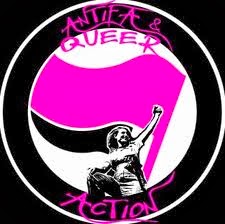Bay Area Antifa alert!
An anti-fascist queer bloc has been called to protest and shut down the Third Position fascist band 'Death In June' concert on Friday, September 13th - 9 pm @ the Mezzanine in San Francisco. While there is a queer bloc all anti-fascists are invited but if you are a straight person please do not dominate the protest. As you can read below Douglas Pearce is a gay fascist so it is best if queer folks are on the front. Any homophobic remarks made by anyone in our presence with be dealt with accordingly.Please contact the Mezzanine to demand they cancel they show or we will shut it down ourselves:
444 Jessie St (between Mint St & 6th St)
San Francisco, CA 94103
Neighborhoods: Union Square
info@mezzaninesf.com
415-625-8880
https://www.facebook.com/mezzanineSF
To get to the Mezzanine by public transport: Bart, Bus or Muni to Powell Street Stop (5th and Market). Walk down 5th toward Mission and take a right into Mint Plaza (near Chez Papa + 54 Mint) Continue down Jessie St. and the venue is on your right.
Why do we oppose Death In June?
Racist, Euro-centric, and Fascist statements made by Douglas Pearce.1. The European Colonization of Australia
\
When asked Do you see Australia inescapably as an outpost of European colonialism? Douglas stated:
"As Dutch, British and French explorers literally put this Great Southern Land on the map it would be ridiculous to say that modern day Australia is anything other than a grand - and successful - outpost of Euro-colonialism and, more specifically Anglo-Celt British colonialism. It's a fact of life like the Euro-colonization of the Americas etc. If it was an outpost of, let's say, Iranian or Zimbabwean colonialism would so many people still be so desperately trying to get into Australia by any means necessary, legal or otherwise? It's doubtful. Thank the Gods for Euro-colonialism!" - Douglas Pearce 1
2. Genocide
Q: How do you imagine these scents of genocide, what’s this “perfume”? What does it evoke to you, in real? What brings men to do that?
A: "I also say in the same song that “you can’t smell experience like that”! But, if genocide smells of anything it’s probably Nostalgia. Once men catch a whiff of that most will chase after it." - Douglas Pearce 2
3. Xenophobia
Q: Looking back and making some kind of the symbolic conclusion to the end of epoch, what are your present anxieties and prophesies about the future?
A: "IT'S HARD NOT TO BE CONCERNED ABOUT THE "END TIME" AS WE RACE TOWARDS THE END OF THE MILLENNIUM. I DO THINK ABOUT IT AND I DO WONDER IF ALL THE PROPHECIES FROM ALL THE DIFFERENT RELIGIONS IN THE WORLD WILL COME TRUE OVER THE NEXT FEW WEEKS/YEARS. I EVEN SOMETIMES WONDER HOW PROPHETIC SOME OF MY WORDS COULD BE. I FEEL THAT 'PURITY OF INTENT' SHOULD ALWAYS DICTATE ART OF WORTH - IN ALL ITS FORMS. I'M VERY CAREFUL WITH THE WORDS I CHOOSE. "EUROPA HAS BURNED AND WILL BURN AGAIN" BECAME ONLY TOO TRUE. UNFORTUNATELY!
THE WORLD SEEMS TO BE SO FULL OF SO MANY DANGERS THAT IT'S HARD TO SINGLE ANY PARTICULAR ONES OUT. CERTAINLY THE MOST OBVIOUS THAT SPRING TO MIND ARE THE GROWTHS IN ISLAMIC FUNDAMENTALISM AND OUT OF CONTROL BREEDING. EVEN IN EUROPA, WITH ZERO POPULATION GROWTH IN MANY COUNTRIES, THOSE WHO ARE DOING THE BREEDING APPEAR TO ME, AND I THINK MANY OTHERS, TO BE OF DUBIOUS CHARACTER. THEY FUCK, THEY HAVE KIDS AND THAT IS ALL THEY DO! I DON'T BELIEVE THAT IS ENOUGH!! I DON'T THINK I NEED TO TELL ANY RUSSIAN ABOUT ISLAMIC FUNDAMENTALISM. I ALWAYS BACKED THE FORMER U.S.S.R IN AFGHANISTAN AND FEEL THE WEST, BY BACKING THE WRONG SIDE IN THAT WAR HAS STILL YET TO PAY THE FULL PRICE OF THAT MISTAKE. I'VE NEVER AGREED WITH THE PHILOSOPHY THAT IF HE IS MY ENEMY'S ENEMY HE MUST BE MY FRIEND. THAT TRULY IS NAIVE. AUSTRALIA IS NOW EXPERIENCING THE CONSEQUENCES OF SUCH NAIVETY WITH INDONESIA. BY THE TIME YOU GET THIS WE COULD BE AT WAR WITH THEM. TRADITIONAL ENEMIES WERE NEVER FRIENDS!" - Douglas Pearce
Q: Some years ago you've left your motherland, claiming that England to your mind "isn't the best place for the spiritual development" in Europe because of the present degradation of the country and the nation. Can you comment these words?
A: "AS I'VE SAID IN A PREVIOUS QUESTION I TRULY FEEL THAT ENGLAND, AND PROBABLY TO A LESSER EXTENT, MAINLAND EUROPA, HAS SEVERE STOCK PROBLEMS. THAT, AS FAR AS I CAN SEE HAS ONLY GOT WORSE. THOSE WHO SHOULDN'T BE ABLE TO BREED ARE DOING SO WITH SUCH FREQUENCY THAT THE UK IS BEING OVER POPULATED BY MORONS WITH NOTHING TO DO EXCEPT HARASS THE REST OF THE POPULATION. THERE IS NO OTHER PLACE FOR THEM. BRITAIN AS AN INDUSTRIAL POWER IS A THING OF YESTERYEAR. LARGE POOLS OF MANUAL, UNSKILLED LABOURERS ARE NO LONGER REQUIRED. HOWEVER, THE OLD HABITS LINGER ON. MONEY IS STILL GIVEN TO THOSE WHO BREED. THE MORE KIDS YOU HAVE THE MORE MONEY YOU GET. THIS IS TOTALLY UNREAL. IN A COUNTRY THAT NOW GAINS ITS INCOME FROM THE ARTS, HIGH TECHNOLOGY AND TOURISM THERE ARE FEW PLACES FOR THOSE CAPABLE OF ONLY PUSHING A BROOM IN FRONT OF THEM.
BRITAIN IMPORTED MILLIONS OF UNSKILLED LABOURERS FROM THE COLONIES FOR THAT KIND OF WORK AND LOOK WHAT A HUGE SUCCESS THAT WAS! THE HATRED IS BARELY RESTRAINED INTO THE OCCASSIONAL RIOT. I DON'T LIKE BEING IN A PLACE WITH SUCH AN ATMOSPHERE. EVEN GERMANY, THE FORMER RICHEST COUNTRY IN WESTERN EUROPA SEEMS TO BE TANGIBLY FALLING TO BITS. IT IS NO LONGER AS CLEAN AND AS WELL ORGANISED AS I REMEMBER FROM, SAY, 10 YEARS AGO. IT HAS BEEN FLOODED BY THOSE WHO WANT BUT, WITH LITTLE TO GIVE! THE WEST'S LIBERALISM WILL BE ITS DEATH." - Douglas Pearce 3
4. "Euro-centric Racialism"
Q: In interviews you've expressed Eurocentrism. How do you feel about fans that are Eurocentric/Racialist?
A: "Depending upon their ' version ' of Eurocentric Racialism, then 9 times out of 10 I feel very comfortable with it. This is how it's supposed to be. I would like to think that the Klu Klux Klan version isn't included in this. Eurocentrics goes beyond reactionary Christian, political militias. I believe in seizing the end of time, not being a passive part of it. " - Douglas Pearce 4
Q: Don't you think your vision concerning the history of Europe (which in your opinion is the best one) is nevertheless a European opinion? I'm not talking about the americans who have no past and who probably have no more future but about the Chinese, for example, who were in the past a very powerful nation...
A: "Yes, I am totally Euro-centric. I'm not overly concerned with the past but, I do care about the present and the future. European culture, morals, ethics, whatever, are under attack from all sides these days. Even, most dangerous of all, from within Europe. Whilst we have room for regret about some of the mistakes of the past (and of the present) regarding our treatment of the earth and some of it's peoples/wildlife, there is also plenty to be content about. I'm tired of being made to feel guilty about the sins of the world. Europe has contributed a MASSIVE amount to the world on ALL fronts. We will regret the day when we let that position slip from our hands and fade from our memory." - Douglas Pearce 5
5. National Socialism
Q: WHY HAVE YOU TAKEN SUCH AN INTEREST IN NATIONAL SOCIALIST GERMANY? DO YOU, FOR INSTANCE, QUESTION YOURSELF WHETHER YOU WOULD HAVE JOINED THE RANKS OR NOT?
A: "Yes, naturally. It's been an overriding interest since I was very, very young. My parents used to be quite angry about the morbid fascination I had as a child for this part of history. In the end, though, they actually gave up on it because I was so sincere in my interest. It wasn't just a passing dalliance but an actual obsession and I seem to be quite knowledgeable in that area. Outside of that, what are the reasons for my interest? I think, overridingly, that one of the main reasons is that you can still communicate with people who have taken part in these events. You just don't have to read books or see films about them, these people are very much alive today." - Douglas Pearce 6
6. The fascist symbol the "Totenkopf"
Q: Throughout the period of Death In June you have employed strong imagery - what is the significance of symbolism such as the Totenkopf, most commonly associated with extreme right-wing philosophy, to you?
A: "The Totenkopf is used all over Europe as a sign of total commitment, so I've never really had any problems with it. When I thought of Death In June it was really the be all and end all of my life - it still is - so that's why I chose to use that symbol, plus the fact that the simple symbolism reads easy. The Totenkopf for Death, and the six for the sixth month - June. I've always been interested, intrigued...and I suppose obsessive with symbols in so many ways and that particular one is a perfect representation. " - Douglas Pearce 7
Douglas P. being gay is not an excuse to promote racist or fascist ideas. One of the founders of fascism was openly homosexual.
While many claim that his work is clearly shock value because Douglas P. is gay, I am queer and recognize his aesthetic to be aligned with that of the SA who was lead by a gay fascist named Ernst Rohm. 8
Gay historian Frank Rector wrote "Although it was clear the Nazi party viewed homosexuals negatively, as was evident from the destruction of Magnus Hirschfeld’s Institute of Sexual Science in Berlin, “some gays [in the SS] may have been reconciled by the knowledge that Hitler’s right hand man, Ernst Rohm, was a homosexual," 8
"projected a social order in which homosexuality would be regarded as a human behaviour pattern of high repute... He flaunted his homosexuality in public and insisted his cronies do the same. He believed straight people weren't as adept at bullying and aggression as homosexuals, so homosexuality was given a high premium in the SA." 8
Gay columnist Johann Hari writes "Rohm often referred to the ancient Greek tradition of sending gay solider couples into battle, because they were believed to be the most ferocious fighters. The famous pass of Thermopylae, for example was held by 300 soldiers - who consisted of 150 gay couples. In its early years, the SA - Hitler and Rohm's underground army - was seen as predominantly gay. Rohm assigned prominent posts to his lovers, making Edmund Heines his deputy and Karl Ernst the SA commander in Berlin. The organisation would sometimes meet in gay bars. The gay art historian Christian Isermayer said in an interview, 'I got to know people in the SA. They used to throw riotous parties even in 1933... I once attended one. It was quite well-behaved but thoroughly gay. But then, in those days, the SA was 'ultra-gay.' " 9
The SA was one of the most violent fascist groups during World War II. In this 2011 interview Douglas Pearce acknowledges his interest in gay fascist Ernst Rohm:
INTERVIEWER: "I recently saw the Danish movie "Brotherhood". The Plot is that Lars has to leave the army after accusations of having made a pass at some of his men. Disillusioned he joins a Neo-Nazi movement, even though they practice gay-bashing. He and his peer Jimmy become embroiled in a secret love affair. Moving from hostility through grudging admiration to friendship and finally passion. Events take a darker turn when their relationship is uncovered. What's your opinion about Brotherhood/Homosexuality in the SA and how can be (if can be) mixed Nazism and Homosexuality?"
Douglas Pearce: "I’ve heard about the ‘Brotherhood’ film you mention but haven’t seen it. I do intend to get a copy of it on DVD soon. I’d be better placed to answer that question regarding that film after that. However, regarding being Gay in the S.A. the early Nazi movement and brotherhood etc. then at this late stage of the game with few, if any, surviving members that were involved in any of that at the time we can only surmise or read books and wonder. And, it is a big wonder! A truly fascinating question as to what was, and what might have been. However, it’s an impossible question to answer with any accuracy. The only thing I can say is that nearly 20 years ago I did have a conversation with a then member of the SS who later became in the war a very high ranking member of the Waffen SS and was around in those early days in 1930s Germany and he said that during the Night Of The Long Knives the question of homosexuality was never brought up. They weren’t sure exactly what was happening when they were told to be on alert at the end of June, 1934 and that they expected an attempt on Hitler’s life from elements in the Storm Troops (S.A.) The Gay angle appeared only after the purge of Ernst Roehm and his comrades as some sort of extra excuse made up by Goering and Goebbels as to why such a purge was necessary. About a year later homosexuality then also became officially illegal in Germany which up until then had no specific laws against being Gay. That was unlike Britain or the USA which had outlawed homosexuality for decades and where it was still punishable by imprisonment and sometimes death. Hitler doesn’t have seemed to have made any direct comments, or even be concerned, about any of his close comrades being Gay and, in fact, there are strong rumours that when he was a struggling artist in Vienna he did spend time being a male prostitute to help pay his bills etc. Being Gay and being aligned to the Nazi Party certainly didn’t become apparently mutually exclusive until the change of laws in 1935." [10]
Crisis from 'left' to right wing
"I think Crisis (Well Doug and me) saw Crisis as way of imbuing or infiltrating a distinct ideological strain of left wing politics into punk." - Tony Wakeford [11]
"At the start of the eighties, Tony and I were involved in radical left politics and beneath it history students. In search of a political view for the future we came across National Bolshevism which is closely connected with the SA hierarchy. People like Gregor Strasser and Ernst Röhm who were later known as 'second revolutionaries' attracted our attention." - Douglas Pearce
- http://www.deathinjune.org/wiki/index.php/Interview:2011-NegativeGuestList
- http://www.deathinjune.org/wiki/index.php/Interview:2010-Obskure1
- www.deathinjune.org/wiki/index.php/Interview:1999-Achtung_Baby
- http://www.deathinjune.org/wiki/index.php/Interview:1998-Scapegoat
- http://www.deathinjune.org/wiki/index.php/Interview:1996-Descent
- http://www.deathinjune.org/wiki/index.php/Interview:1994-Per_Nostrom
- www.deathinjune.org/wiki/index.php/Interview:1996-Judas_Kiss
- excerpt from - Nazi Extermination of Homosexuals by Frank Rector (New York 1981)
- http://www.huffingtonpost.com/johann-hari/the-strange-strange-story_b_136697.html
- http://www.deathinjune.org/wiki/index.php/Interview:2011-Pride-CulturaGay
- http://www.deathinjune.org/wiki/index.php/Interview:200
Death in June will be playing at eight locations across the United States. Please contact the venues, tell your community, and organize non-violent direct action if necessary.
Death in June Tour Dates and Venue Information
- THURS. 12TH SEPT. THE VEX LOS ANGELES CA.
- FRI. 13TH SEPT. MEZZANINE SAN FRANCISCO CA.
- SAT. 14TH SEPT. INFEST AUSTIN TX.
- MON. 16TH SEPT. REGGIES CHICAGO IL.
- TUES. 17TH SEPT. RESPECTABLE STREET COCONUT CREEK/WEST PALM BEACH FL.
- FRI. 20TH SEPT. THE BELL HOUSE BROOKLYN NY.
- SAT. 21ST SEPT. OLD TOWN HALL SALEM MASS.
- SUN. 22ND SEPT. THE OTTOBAR BALTIMORE MD.
Further Reading
- Death in June - a Nazi band?
- Ex-Crisis member Tony Wakeford
- A great site exposing Third Positionist bands, Who Makes the Nazis?






